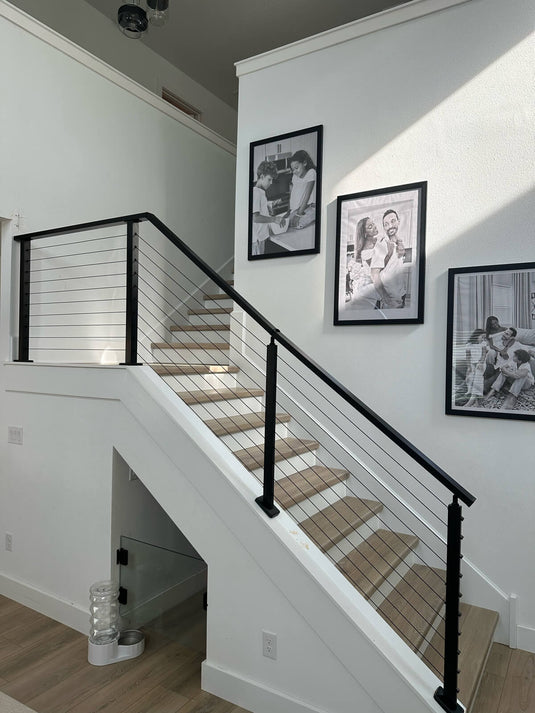TABLE OF CONTENTS
11 Best Woods For Outdoor Stair Railing

Choosing the right wood for your outdoor stair railing is crucial for both safety and aesthetics. While many woods can look beautiful initially, not all can withstand the challenges of outdoor exposure—rain, sun, temperature changes, and humidity. The best outdoor railings combine durability with natural beauty, requiring minimal maintenance while providing years of reliable service. From premium hardwoods like Ipe and Teak to budget-friendly options like pressure-treated pine, each wood type offers unique benefits and considerations. In this guide, we'll talk about the 11 best wood choices for outdoor stair railings, helping you make an informed decision that balances appearance, durability, and cost.
Premium Hardwoods for Outdoor Railings

1. Ipe
Ipe (Brazilian Walnut) stands as the titan of outdoor hardwoods, boasting exceptional durability that can last up to 50 years with minimal maintenance. This dense, naturally fire-resistant wood withstands extreme weather conditions without warping or rotting. While Ipe commands a premium price ($20-30 per linear foot installed), its longevity and low maintenance requirements often justify the initial investment. Regular oil treatment every 2-3 years is recommended to maintain its rich, dark brown color, though many homeowners allow it to naturally weather to a distinguished silver-gray.
2. Teak
Teak has earned its reputation as the gold standard for outdoor wood, thanks to its high natural oil content that provides built-in weather resistance. This traditional favorite offers exceptional resistance to rot, insects, and weather damage, potentially lasting over 75 years when properly maintained. Though teak represents one of the most expensive options ($25-35 per linear foot installed), its unmatched longevity and minimal maintenance needs make it a worthy investment for luxury outdoor projects.
3. White Oak
White Oak delivers premium performance at a more moderate price point ($15-25 per linear foot installed), making it a smart choice for budget-conscious homeowners seeking durability. This domestic hardwood naturally resists rot and insects, thanks to its high tannin content. Installation requires pre-drilling to prevent splitting, but White Oak's availability and workability make it a favorite among contractors. Regular sealing every 2-3 years helps maintain its natural light brown color and extends its already impressive 30+ year lifespan.
Mid-Range Reliable Woods for Outdoor Railings

4. Cedar
Cedar, particularly Western Red Cedar, offers natural resistance to decay and insects thanks to its aromatic oils and chemical compounds. This lightweight wood is remarkably easy to work with, making it a favorite among DIY enthusiasts and professionals alike. Priced at $10-15 per linear foot installed, Cedar provides excellent value while requiring minimal maintenance. Its natural reddish-brown color can be preserved with annual sealing or allowed to weather to a sophisticated silver-gray. The wood's natural aromatics also add a pleasant scent to your outdoor space.
5. Redwood
Redwood combines remarkable weather resistance with stunning natural beauty, making it a traditional favorite for outdoor railings. Its high tannin content naturally repels insects and resists rot, while its straight grain provides excellent stability in varying weather conditions. Though availability may be limited outside the western United States, Redwood's moderate price point ($12-18 per linear foot installed) and 20+ year lifespan make it worth considering. Regular sealing every 1-2 years helps maintain its signature rich red color.
6. Black Locust
Black Locust stands out as an exceptionally durable domestic hardwood that rivals tropical options at a friendlier price point ($8-14 per linear foot installed). This often-overlooked species offers natural rot resistance comparable to Ipe, with a density that ensures long-term structural stability. While installation for outdoor stair railings requires pre-drilling and sharp tools due to its hardness, Black Locust's 30+ year lifespan and minimal maintenance needs make it an excellent choice for budget-conscious homeowners seeking premium durability.
Economical Woods Choices for Outdoor Railings
7. Pressure-Treated Pine
Pressure-treated pine remains the most popular budget-friendly choice for outdoor railings, offering impressive durability at $6-10 per linear foot installed. The chemical treatment process infuses the wood with preservatives that resist rot, insects, and fungal decay. While not naturally as durable as hardwoods, properly maintained pressure-treated pine can last 15-20 years. Regular cleaning and sealing every 1-2 years helps prevent cracking and maintains its appearance. Installation is straightforward, though it's important to use appropriate stainless steel or coated fasteners to prevent corrosion.
8. Douglas Fir
Douglas Fir provides excellent strength and stability at a reasonable price point ($8–12 per linear foot installed). This versatile wood offers an attractive grain pattern and takes stains well, making it popular for visible outdoor structures. While not naturally rot-resistant, proper treatment with preservatives and regular maintenance can extend its lifespan to 15+ years. Its availability in long, straight pieces makes it ideal for continuous railing runs, though it requires thorough sealing and annual maintenance to perform well outdoors.
Distinctive Woods for Unique Railings
9. Mahogany
Mahogany brings unmatched elegance to outdoor railings with its rich, reddish-brown color and distinctive grain patterns. This premium hardwood offers excellent weather resistance and dimensional stability, making it ideal for high-end outdoor projects. While expensive ($22-30 per linear foot installed), mahogany's natural resistance to rot and insects, combined with its 30+ year lifespan, justifies the investment. Regular oiling every 1-2 years helps maintain its luxurious appearance and ensures maximum longevity in outdoor applications.
10. Cypress
Cypress earns its reputation as "the wood eternal" through exceptional natural preservation properties, particularly in humid climates. Native to the southeastern United States, cypress contains Cypressene, a natural preservative that repels insects and prevents decay. Priced moderately at $12-18 per linear foot installed, it offers excellent value for coastal and high-humidity environments. The wood weathers gracefully to a light gray if left untreated, though annual sealing helps maintain its honey-brown color and extends its 25+ year lifespan.
11. Cumaru
Cumaru, often called Brazilian Teak, delivers Ipe-like durability at a slightly lower price point ($18-25 per linear foot installed). This dense tropical hardwood boasts exceptional resistance to weather, insects, and decay, with a beautiful golden to reddish-brown color. Installation requires specialized tools and pre-drilling due to its extreme hardness, but the result is a stunning, long-lasting railing that can survive 40+ years outdoors. Regular oiling enhances its rich color, though many homeowners appreciate its natural weathering to a sophisticated silver gray.
Essential Care to Protect Your Outdoor Wood Railings

Proper maintenance of outdoor wood railings ensures their longevity and preserves their beauty. Start with initial finishing: apply a high-quality sealer or oil-based finish specifically designed for exterior wood within two weeks of installation. For optimal protection, consider UV-resistant products that contain both water repellents and mildewcides.
Maintenance Schedule:
- Monthly: Visual inspection and gentle cleaning
- Quarterly: Thorough cleaning with wood-appropriate cleaner
- Annually: Deep clean and resealing/refinishing
- Every 2-3 years: Professional inspection and repairs
Weather Protection Tips:
- Clear snow promptly in winter
- Address water pooling immediately
- Use covered caps on posts
- Apply UV protection annually
Regular maintenance costs far less than premature replacement. Address any issues promptly to prevent more extensive damage.




